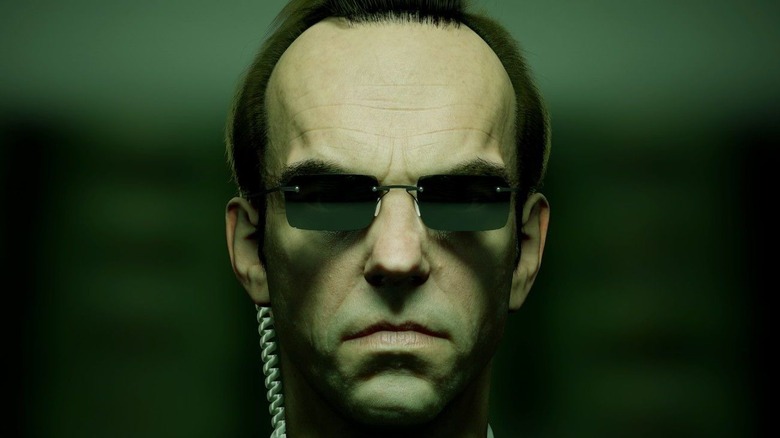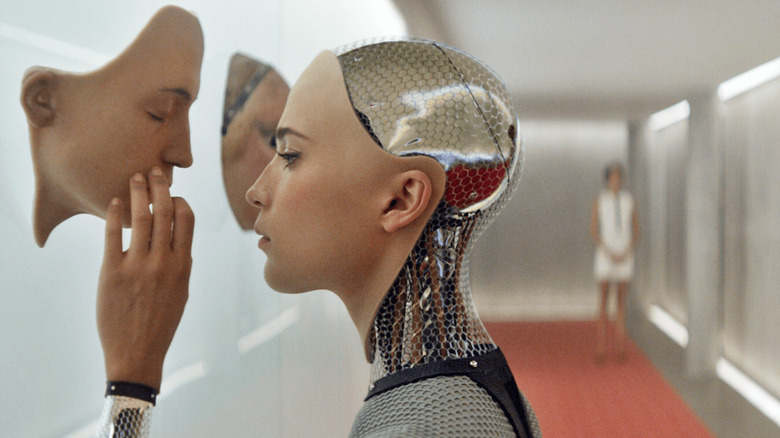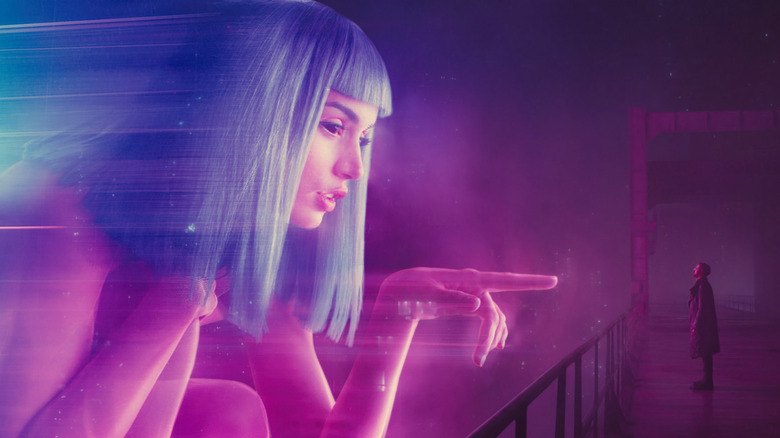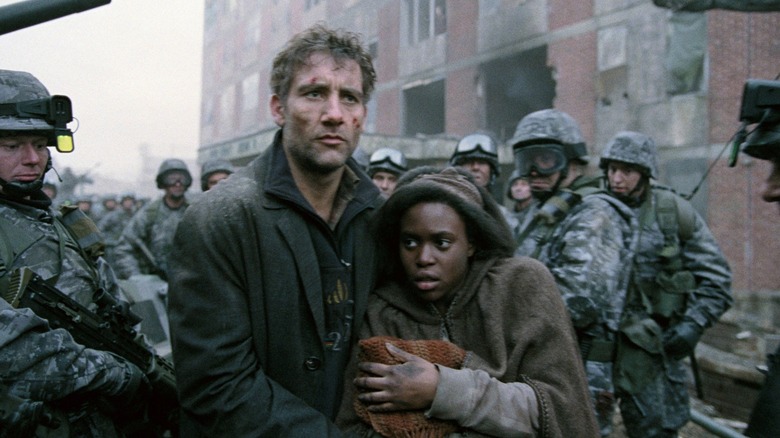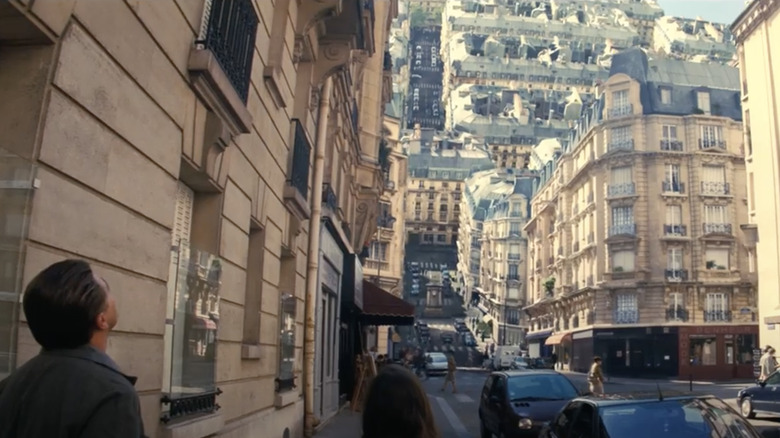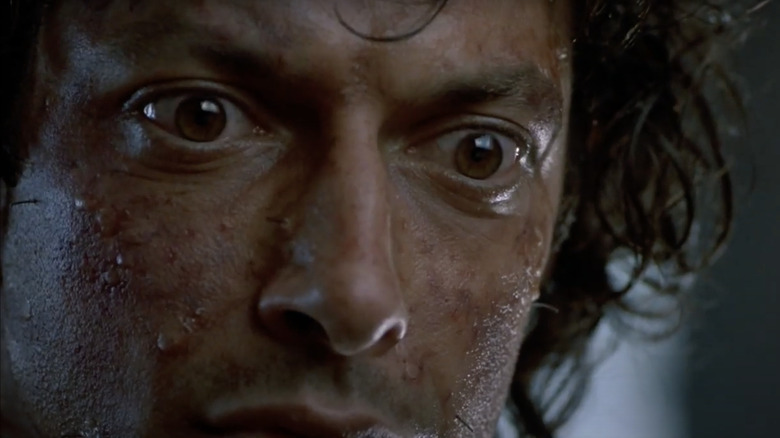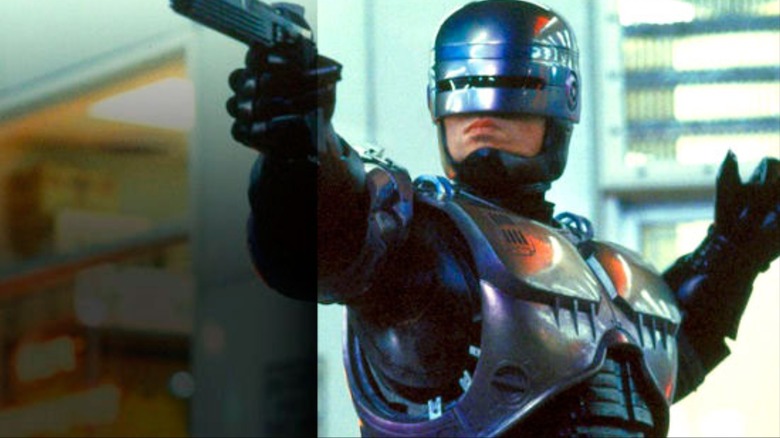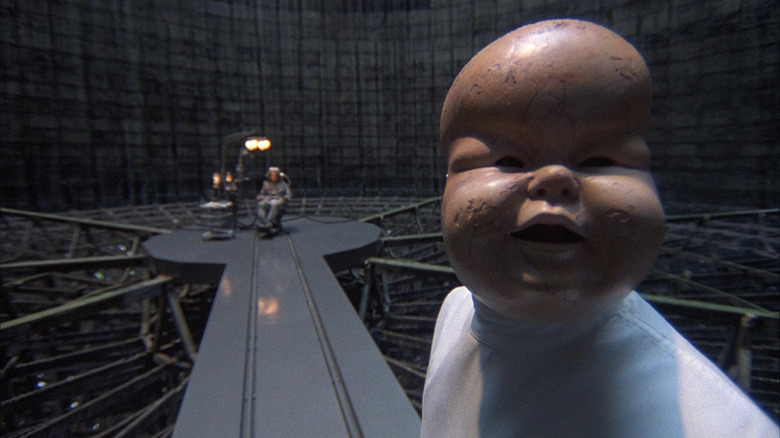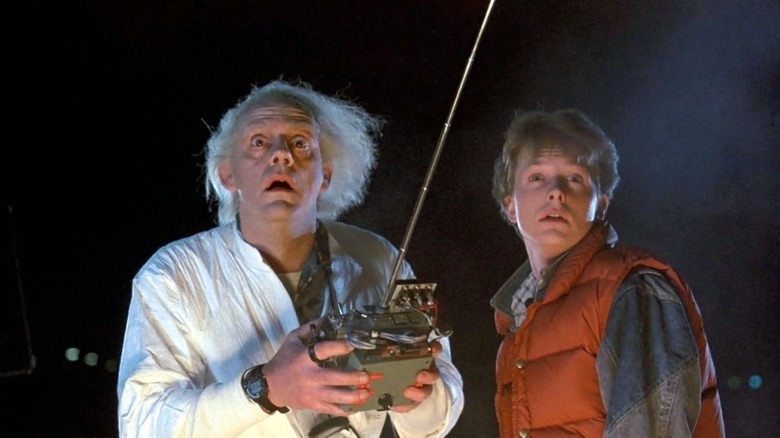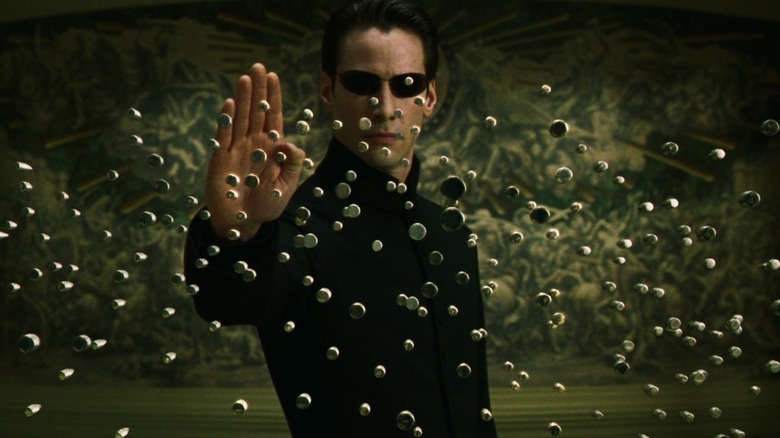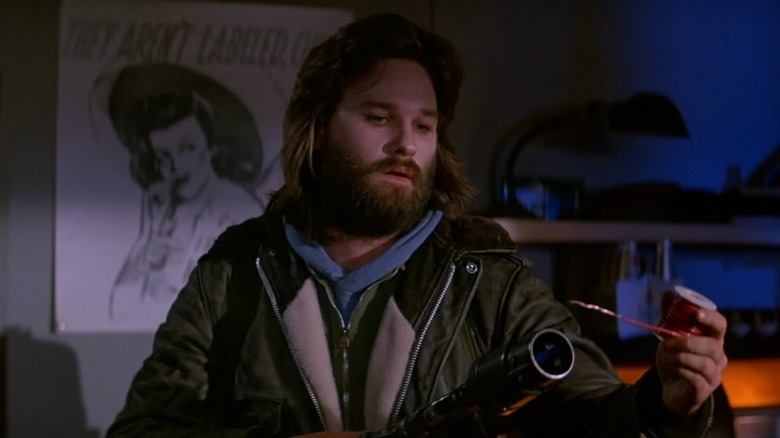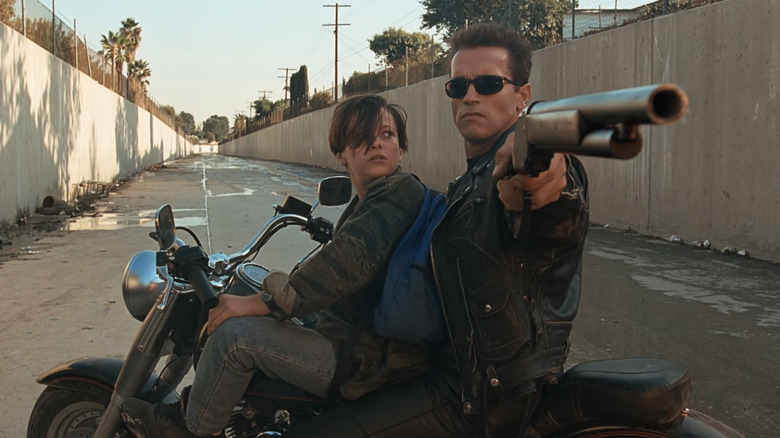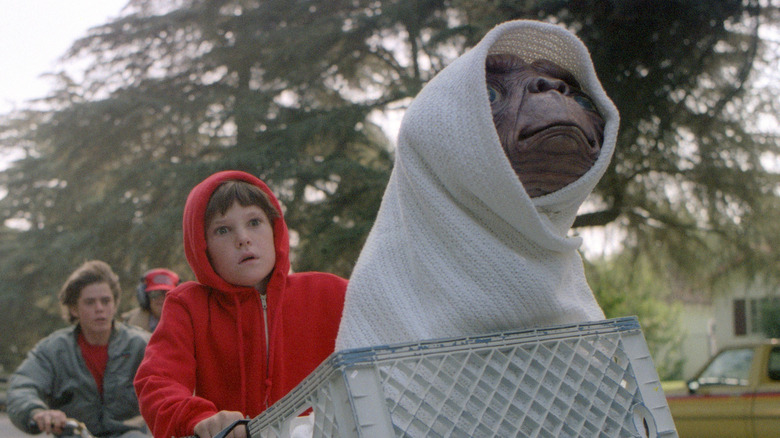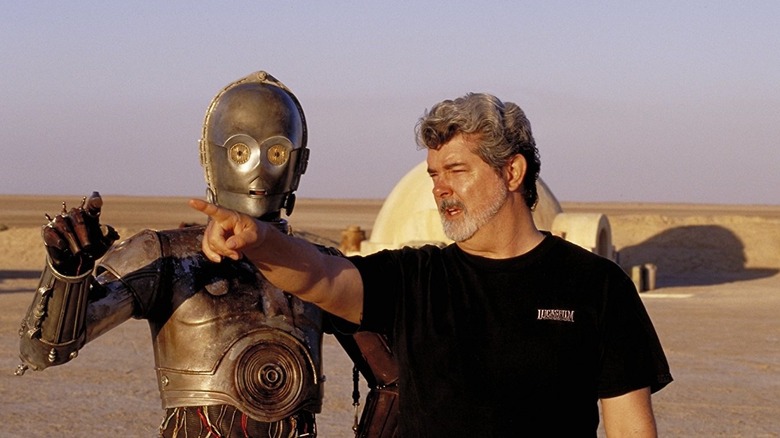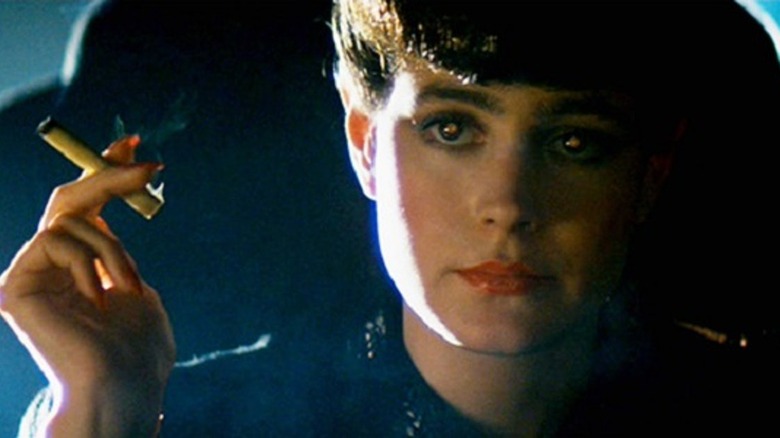The 14 Most Important Sci-Fi Directors Of The Last 50 Years
Of all the fictional genres, sci-fi is the one most interested in exploring man's relationship to science and technology, delving into both the possibilities and the consequences of humanity's technological advancements, envisioning futuristic and faraway worlds, and questioning our place in a universe full of unknown wonders.
Over the past 50 years, technology has changed our world in previously unimagined ways, and science fiction has adjusted accordingly. While there have been a host of incredible science fiction films made over these years, some have left a more indelible cultural mark than others. From stories of faraway galaxies and alternate dimensions, wormholes and time-loops, and dystopian versions of our own fragile planet, the directors at the helm of these films have helped shape our vision of the future, and opened up our imaginations to worlds both wondrous and terrifying. There's little doubt that they're the most important sci-fi directors of their time.
Alex Garland
Alex Garland first made his mark on in the late '90s, penning the novel and the Leonardo DiCaprio-starring adaptation of "The Beach" before writing screenplays for other bangers like the post-apocalyptic virus-centric horror film "28 Days Later." Garland's more recent work as a director, though, has earned him place as one of the important sci-fi directors of his generation.
Garland's directorial debut, "Ex Machina," is not only a deftly-made, cool-as-heck sci-fi psychological thriller, but it brilliantly highlights the terrifying potential implications of artificial intelligence. The sleek, single-location film follows a computer programmer, Caleb (Domhnall Gleeson), as he visits his wealthy boss Nathan's (Oscar Isaac) isolated high-tech compound, only to fall in love with an AI named Ava (Alicia Vikander). But who's really in charge?
Garland went on to direct "Annihilation," the critically-lauded adaptation of the first book in Jeff VanderMeer's "Southern Reach" trilogy. Starring Natalie Portman as part of a troop of women sent by the government to explore a phenomenon known as "The Shimmer," the film gave us some of the most memorable visuals and stunningly terrifying scenes in recent memory, including a mutant DNA-warped bear-monster and Portman dancing eerily with her humanoid doppelgänger.
Denis Villeneuve
French-Canadian director Denis Villeneuve was a festival circuit darling for years before reaching prominence with higher budget films such as "Prisoners" and "Sicario." But his eighth film, "Arrival," marked the beginning of his sci-fi directorial dominance. Starring Amy Adams as a linguist who must learn to decipher alien language in order to save the human race, "Arrival" drew much praise, earning eight Academy Award nominations and high box office returns.
Villeneuve was then tapped to direct "Blade Runner 2049," the sequel to Ridley Scott's sci-fi masterpiece. Bringing Harrison Ford back as his iconic character Richard Deckard and pairing him with Ryan Gosling as Officer K, "Blade Runner 2049" was an impressive follow-up to the original that continued to tease audiences with the question of whether Deckard is a replicant.
Though "Blade Runner 2049" was something of a box office disappointment, fans and critics alike praised the film, which helped set up Villeneuve to direct the forthcoming "Dune" for Warner Bros. Starring the likes of Timothée Chalamet and Zendaya, Villenueve's "Dune" is the latest attempt at adapting Frank Herbert's 1965 novel about interstellar nobles fighting over ownership of a life-expanding drug called "spice," following an unsuccessful attempt by Alexander Jodorowoski and a critically panned 1984 box-office bomb helmed by David Lynch. The latest "Dune" has an epic $165 million budget and is intended to be the first of a two-film series. Let's hope Villeneuve knocks it out of the universe.
Alfonso Cuarón
Alfonso Cuarón is a Mexican director who cut his teeth on movies like "A Little Princess" and "Great Expectations" before gaining international recognition in 2002 with his provocative and sexy road trip film "Y Tu Mama Tambien." He then went on to direct what is generally considered the best film in the Harry Potter series, "Harry Potter and the Prisoner of Azkaban."
But Cuarón's sci-fi films are his most notable and critically-acclaimed work. 2006's "Children of Men," based on P.D. James' dystopian novel about a futuristic world in which humanity has faced 18 years of infertility, is widely considered one of the best films of the 21st century, and earned Cuarón his first Academy award nominations.
Cuarón followed this up in 2013 with the Academy Award-winning, George Clooney and Sandra Bullock-starring space thriller, "Gravity." Widely praised for its stunning visuals, "Gravity" tracks two stranded astronauts as they attempt to return home after their shuttle is destroyed. "Gravity" was a mega-hit, becoming both Clooney and Bullock's highest-grossing film to date, winning seven Academy Awards, and helping to secure Cuarón's place in the annals of sci-fi film history.
Christopher Nolan
The Guardian once called Christopher Nolan "The Man Who Rebooted the Blockbuster," in part for his work on "The Dark Knight" trilogy. Though he's directed smaller thrillers like "Insomnia" and "Memento," as well as the war film "Dunkirk" and the magician-centric "The Prestige," the British director has made a lasting mark with his big budget sci-fi mind-benders like "Inception" and "Interstellar."
In "Inception," which stars Leo DiCaprio as a dream-thief, Nolan plays heavily on the "dream within a dream" concept, and utilizes the best computer-generated effects of the era to create world-bending (literally) head-trip of a film. "Inception" was indeed a blockbuster, becoming one of the highest grossing films of the 2010s, and earning multiple Academy Awards while adding a new slang suffix to the English language: "-ception," used when describing things having a nesting effect.
Nolan's other sci-fi epic, the more emotional "Interstellar," explored the possibilities of wormholes, with Matthew McConaughey playing a widowed NASA pilot searching for a new world for humanity to live on. Even before "Tenet" premiered in 2020, these films cinched Nolan's spot as one of the most important sci-fi directors of his time.
David Cronenberg
David Cronenberg is a director best known for his propensity for body horror, blood, and gore, having earned him such affectionate nicknames as "The King of Venereal Horror" and "The Baron of Blood." But Cronenberg's fascination with the melding of the psychological and the technological has earned him a place as one of the most important sci-fi directors to date, too. From the head-exploding "Scanners" to the video-centric nightmare of "Videodrome," Cronenberg's uniquely visceral brand of sci-fi horror offers much to think about, and even more to be terrified of. His adaptation of Stephen King's "The Dead Zone" ranks among the best adaptations of King's works.
But Cronenberg's adaptation of "The Fly" is his most widely acclaimed and well-known work. A loose remake of the 1958 film of the same name, Cronenberg's version stars Jeff Goldblum as the eccentric scientist Seth Brundle, who begins to transform into a fly after one inadvertently lands inside his self-built teleportation machine. The film won an Academy Award for makeup for the horrifying "Brundlefly," but it's the film's emotional core, including Brundle's relationship to journalist Ronnie (Geena Davis) and his own thoughts as his body betrays him, that helps elevate "The Fly." It's terrifying, but it's also a thoughtful, tragic tale that highlights the folly of man and the limits of our control over science.
Paul Verhoeven
The man who directed "Showgirls" might not seem like an obvious choice for one of the most important sci-fi directors of the past half-century, but Dutch director Paul Verhoeven is not a man to be tied to any one particular genre, or any pre-conceived expectations. With a long list of films that includes everything from erotic thrillers to historical dramas, some of Verhoeven's most notable work is his big-budget sci-fi action films: "Robocop" (1987), "Total Recall" (1990), and "Starship Troopers" (1997).
Each one of these films has left its mark on the world of sci-fi in its own way, thanks to Verhoeven's use of social commentary and knack for special effects-heavy action, but it's perhaps "Robocop" that left the deepest imprint. The smart, violent sci-fi action classic stars Peter Weller as a Detroit police officer who is critically injured in the line of duty, only to be brought back to life as a cyborg by Omni Consumer Products, an evil corporation seeking to privatize the police force. Delving into questions of identity and what makes us human while satirizing Reagan era-policies and corporate greed, "Robocop" holds up extremely well and remains as relevant today as ever.
Terry Gilliam
Former Monty Python member Terry Gilliam's films often fall into the realm of fantasy, but of his varied filmography, certain works stand out as sci-fi classics. One is "Twelve Monkeys" (1995), in which a prisoner from the future (Bruce Willis) is sent back in time to uncover the cause of a plague set to destroy humanity. Violent, insane, and heady, the film initially went over critics' and audiences' heads, but has since become a cult classic, one more relevant now than ever.
Gilliam's most notable film, though, is "Brazil" (1985), a dystopian, satirical sci-fi-fantasy that takes aim at the crushing gears of corporatism and bureaucracy via the misadventures of a low-level office worker, Sam (Jonathan Pryce). When a fly jammed in a printer leads to a misspelling on a government form, it sets off a chain of events leading the hapless, daydream-prone Sam to try to save the girl of his fantasies while attempting to steer clear of the all-seeing totalitarian body, the "Ministry of Information."
Inspired in part by George Orwell's "1984," (Gilliam toyed with the idea of calling the film "1984 1/2"), and described by Gilliam as "a post-Orwellian view of a pre-Orwellian world," one could say Brazil was "1984" by way of 1985, but its cultural relevance and impact is no less strong today. "Brazil" is often cited as an inspiration for other filmmakers, including the Coen brothers' "The Hudsucker Proxy" and Jean-Pierre Jeunet and Marc Caro's "Delicatessen."
Robert Zemeckis
Great Scott! We'd be remiss to create an "important sci-fi directors" list and not include Robert Zemeckis. 1985's time-travel sci-fi comedy, "Back to the Future," is widely considered to be one of the greatest films ever made, and remains enduringly popular worldwide, with an outsized cultural influence. The film introduced the world to Marty McFly (Michael J. Fox), a typical teenager who travels via a time machine fashioned out of a Delorean back to 1955. There, he meets his future mom and dad (Lea Thompson, Crispin Glover) who are still in high school, but when his mom falls in love with him, he has to turn things around or risk a bleak future in which he hasn't been born at all.
"Back to the Future" was the biggest box office hit of 1985, spawning a franchise with two Zemeckis-directed sequels, some spinoffs, and even a ride at Universal Studios theme parks. What could be more important than that?
The Wachowskis
Wake up, Neo.
One does not simply make a list of important sci-fi directors and leave out Lana and Lilli Wachowski, writer-directors of "The Matrix" trilogy. Drawing on influences from Japanese anime as well as Hong Kong action films, "The Matrix" took 1999 by storm on its release, with audiences and critics alike blown away by its impressive action sequences and groundbreaking visual effects. Wrapping mind-bending philosophical and spiritual themes in a sleek cyberpunk aesthetic, "The Matrix" basically asks the question, "What if we're all just living in a simulation, man?" The results are incredibly entertaining. With "The Matrix," the Wachowskis pushed sci-fi to new and exciting places, helping coin the concept of taking the "red pill" and delivering quotable wisdom such as "there is no spoon."
While The Wachowskis continued their sci-fi streak with films like "Cloud Atlas" and "Jupiter Ascending," their names remain synonymous with the "The Matrix." Luckily for us there's a fourth film in "The Matrix" series on the way from Lana Wachowski, albeit without Lilli's involvement.
John Carpenter
John Carpenter is known as the "Master of Horror" thanks to classic scarers like "Halloween" (1978), but some of his films are also works of sci-fi mastery, including his sci-fi horror masterpiece, "The Thing" (1982). An adaptation of John Campbell Jr.'s novella "Who Goes There?" and its 1951 film adaptation, "The Thing from Another World," Carpenter's "The Thing" follows a group of scientific researchers in Antarctica who encounter a parasitic alien life form able to convincingly mimic other organisms, and which threatens to destroy mankind.
Starring Kurt Russell as helicopter pilot J.R. MacReady, "The Thing" effectively and chillingly portrays the paranoia and dread that consumes the isolated group as they lose the ability to trust one another, unable to distinguish who may be human and who may be a "thing." Initially panned, "The Thing" has been reappraised over the years and is now considered one of the best horror and sci-fi films of all time.
Carpenter's other notable sci-fi works include "They Live," "Escape from New York," and "Starman." In 2019, Carpenter was honored with a Golden Coach award at the Cannes festival for his lifetime achievements in cinema, joining directors such as Martin Scorsese, Werner Herzog, and Agnes Varda.
James Cameron
James Cameron's name is synonymous with action-packed sci-fi of the huge budget, high box-office variety, and we are certainly thankful for it. Cameron currently holds the number one slot for highest-grossing movie of all time with his epic sci-fi fantasy, "Avatar." In fact, "Avatar" has generated so much revenue that it even has its own themed land at Disney's Animal Kingdom theme park.
Before Cameron's worldwide box office domination, he cut his teeth on the 1984 sci-fi action classic "The Terminator." Starring Arnold Schwarzenegger as a cyborg killer sent back in time to kill Sarah Conner (Linda Hamilton) before she births the son who is destined to save humanity, "The Terminator" was a hit that spawned a billion-dollar franchise; its sequel, "Terminator 2: Judgment Day" broke global box office records and earned critical praise as one of the better sequels ever made.
In between Terminators, Cameron found time to write and direct yet another sci-fi action classic, "Aliens" (1986), which is also considered by many to be one of the best science fiction and action films ever made.
Steven Spielberg
Steven Spielberg is one of the most notable directors of all time. His contributions to cinema and pop culture are immeasurable, including those of his many sci-fi films, which include "Close Encounters of the Third Kind", "A.I. Artificial Intelligence," "Minority Report," and "War of the Worlds."
"ET: The Extra Terrestrial" (1982), about a boy named Elliott who befriends a wayward alien left behind by his extra-terrestrial companions, was the highest-grossing film of all time for years after its release, and remains one of the director's most-beloved movies. It's one of many Spielberg films to be added to the National Film Registry as being "culturally, historically, or aesthetically significant." The logo for Spielberg's production company, Amblin Entertainment, features an image from the film of Elliott and E.T. riding a bicycle across the moon, proving that "E.T." holds as special a place in the director's heart — as it does in all of ours.
George Lucas
"A long time ago in a galaxy far, far away..."
You'd be hard-pressed to find anyone not familiar with the epic phrase from the opening crawl of George Lucas' "Star Wars" (1977). The main films in Lucas' epic space opera and the franchise it spawned still dominate the pop culture landscape today. Retroactively titled "Star Wars: Episode IV — A New Hope," "Star Wars" began the heroic saga of Luke Skywalker, which ultimately spanned nine films across three trilogies, and became a global phenomenon thanks to its iconic characters and compelling world-building.
Although "A New Hope" was made more than 40 years ago, Lucas remains one of the most important sci-fi directors of our time thanks to the enduring legacy of the Star Wars franchise, including the prequel trilogy he helmed between 1999 and 2005. Spawning tv series, comics, video games, theme park lands and tons of merch, Star Wars remains ever-popular. George Lucas, may the Force be with you, always.
Ridley Scott
Sir Ridley Scott has directed many excellent films, but he tops our list of important sci-fi directors for directing two of the best sci-fi films of all time: "Alien" (1979) and "Blade Runner" (1982). The franchise-spawning sci-fi horror film "Alien" stars Sigourney Weaver as Ellen Ripley, a crew member of the ill-fated space tug Nostromo. After discovering a crop of egg-like objects on the moon LV-426, the crew inadvertently allows a chest-bursting alien on board. The rest is sci-fi movie history. Weaver's Ripley character in "Alien" was groundbreaking in the way it challenged traditional gender roles, resulting in one of the most significant female protagonists in cinema.
"Blade Runner" is another of Scott's masterpieces, and a stone-cold neo-noir sci-fi classic. Based on Phillip K. Dick's story "Do Androids Dream of Electric Sheep?" and set in a futuristic dystopian Los Angeles, the film follows ex-cop Richard Deckard (Harrison Ford), a "blade runner" tasked with hunting four "replicants" who have escaped from the colonies and returned to earth. With its futuristic industrial production design, a haunting synth-heavy soundtrack by Vangelis, and complex ruminations on what makes humans human, "Blade Runner" is an iconic, influential, and enduring work of sci-fi cinema.
